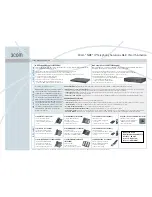
5
ADDITIONAL SAFETY RULES FOR
TOOL
1.
Be aware that this tool is always in an operating
condition, because it does not have to be
plugged into an electrical outlet.
2.
Wear a hard hat (safety helmet), safety glasses
and/or face shield. It is also highly recom-
mended that you wear a dust mask, ear protec-
tors and thickly padded gloves.
3.
Check the blade carefully for cracks or damage
before operation. Replace cracked or damaged
blade immediately.
4.
Do not attempt to cut workpieces larger than
specified in this manual (especially hollow pipe).
The blade might snap and cause an injury.
(Fig. 1)
5.
Hold the tool firmly.
6.
Be sure no one is below when using the tool in
high locations.
7.
Do not point the tool at anyone in the immediate
vicinity.
8.
When making a “blind” cut (you can’t see behind
what is being cut), be sure that hidden electrical
wiring or water pipes are not in the path of the
cut. If wires are present, they must be discon-
nected at their power source by a qualified per-
son or avoided to prevent the possibility of lethal
shock or fire. Always hold the tool ONLY by the
insulated gripping surfaces to prevent any elec-
tric shock if you accidentally cut through a “live”
wire. Water pipes in “blind” areas must be
drained and capped before cutting.
9.
Be careful not to hit the end of the blade against
something during operation. Damage to the tool
or dangerous blade breakage may occur. (Fig. 2)
10. Watch out for cut-off portions of the workpiece
being cut. They may fall and injure you or some-
one near you.
11. When cutting metals, be cautious of hot flying
chips.
12. Do not touch the blade or the workpiece immedi-
ately after operation; they may be extremely hot
and could burn your skin.
13. If you withdraw the blade from the workpiece
during operation, strong reaction will be pro-
duced, causing the blade to snap or causing you
to lose your grip and control of the tool. Always
switch off the tool and wait until the blade has
come to a complete stop before withdrawing the
blade from the workpiece.
SAVE THESE INSTRUCTIONS.
OPERATING INSTRUCTIONS
Installing or removing battery cartridge (Fig. 3)
• Always switch off the tool before insertion or removal of
the battery cartridge.
• To remove the battery cartridge, withdraw it from the
tool while pressing the push buttons on both sides of
the cartridge.
• To insert the battery cartridge, align the tongue on the
battery cartridge with the groove in the housing and slip
it into place. Always insert it all the way until it locks in
place with a little click. If not, it may accidentally fall out
of the tool, causing injury to you or someone around
you.
• Do not use force when inserting the battery cartridge. If
the cartridge does not slide in easily, it is not being
Charging (Fig. 4)
Your new battery cartridge is not charged. You will need to charge it before use. Use the battery charger to charge the
battery cartridge.
Plug the battery charger into the proper AC voltage source. The charging light will flash in green color. Insert the bat-
tery cartridge so that the plus and minus terminals on the battery cartridge are on the same sides as their respective
markings on the battery charger. Insert the cartridge fully into the port so that it rests on the charger port floor. When
the battery cartridge is inserted, the charging light color will change from green to red and charging wil begin. The
charging light will remain lit steadily during charging. When the charging light color changes from red to green, the
charging cycle is complete. Refer to the table below for the charging time. If you leave the battery cartridge in the
charger after the charging cycle is complete, the charger will switch into its “trickle charge (maintenance charge)”
mode which will last approximately 24 hours. After charging, unplug the charger from the power source.
CAUTION:
• The battery charger is for charging Makita battery cartridge. Never use it for other purposes or for other manufac-
turer’s batteries.
• When you charge a new battery cartridge or a battery cartridge which has not been used for a long period of time, it
may not accept a full charge. This is a normal condition and does not indicate a problem. You can recharge the bat-
tery cartridge fully after discharging it completely and recharging a couple of times.
• If you charge a battery cartridge from a just-operated tool or a battery cartridge which has been left in a location
exposed to direct sunlight or heat for a long time, the charging light may flash in red color. If this occurs, wait for a
while. Charging will begin after the battery cartridge cools. The battery cartridge will cool faster if you remove the
battery cartridge from the battery charger.
Battery type
Capacity (mAh)
Number of cells
Charging time
1422
2,000
12
Approx. 45 min.
1433
2,200
12
Approx. 50 min.
1434
2,600
12
Approx. 60 min.
1435
3,000
12
Approx. 70 min.
Содержание JR140D
Страница 2: ...2 1 3 4 1 2 5 6 5 1 5 2 5 3 6 2 6 1 1 2 3 4 5 6 ...
Страница 3: ...3 11 13 12 14 16 15 7 8 9 10 11 8 7 10 9 ...
Страница 49: ...49 ...
Страница 50: ...50 ...
Страница 51: ...51 ...
Страница 52: ...Makita Corporation Anjo Aichi Japan Made in U S A 884246C991 ...






































